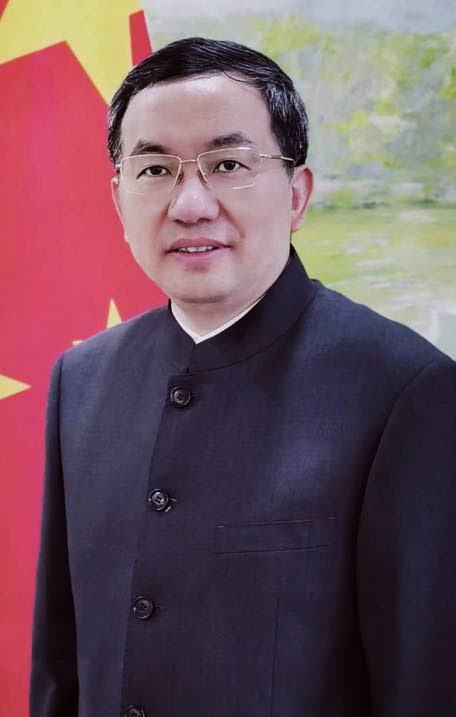Building a community of life for man and nature

FANG QIU
World leaders gathered in Glasgow at the 26th UN Climate Change Conference (COP26) to discuss a way forward for a bright future for mankind in terms of tackling the challenge of climate change.
Chinese President Xi Jinping made a written statement to COP26, urging all parties to uphold multilateral consensus, to focus on concrete actions and to accelerate the green transition. He also urged all parties to take stronger actions to jointly tackle the climate challenge and called on developed countries to provide support to help developing countries do better.
Xi Jinping repeatedly speaks of climate change in the international arena, which shows the firm determination of China to combat climate change. Last year, Xi announced at the United Nations General Assembly that China would strive to peak carbon emissions before 2030 and achieve carbon neutrality before 2060, the largest reduction in carbon intensity in the world with a time span far shorter than any developed countries.
Over the first weekend of the conference, Xi also spoke with G20 leaders at length on climate change, urging countries to balance environmental protection and economic development, address climate change and safeguard people’s livelihood.
To realise its emission reduction ambitions, China is putting in place a top-level “1+N” policy framework. Recently, China released two directives, namely, the Working Guidance for Carbon Dioxide Peaking and Carbon Neutrality in Full and Faithful Implementation of the New Development Philosophy, which is the “1,” and the Action Plan for Carbon Dioxide Peaking Before 2030, which constitutes one of the “N.”
Specific implementation plans for key areas such as energy, industry, construction and transport, and for key sectors such as coal, electricity, iron and steel, and cement will be rolled out, coupled with supporting measures in terms of science and technology, carbon sink, fiscal and taxation, and financial incentives.
Visions will come true only when we act on them. China has continued to take solid steps in green, low-carbon and sustainable development. Starting from the 12th Five-year Plan period (2011-2015), China has incorporated reducing carbon intensity into the national economic and social development plans as binding targets. As a result, China's carbon intensity in 2020 was 18.8 per cent lower than that in 2015, and 48.4 per cent less than that in 2005.
China attaches great importance to market mechanism and established the national carbon market in July 2021 with a total volume of 4.5 billion tonnes of carbon dioxide emissions, making it the world's largest emissions trading system.
China’s new energy industry is witnessing strong growth. China has topped the world in NEV (neighbourhood electric vehicle) output and sales for the last six years. In June the country's NEV fleet reached 6.03 million. In the manufacture of wind power and PV (photovoltaics) power generation equipment, China has established the most complete industrial chain in the world and led the world in PV capacity additions for eight consecutive years, helping to bring down the cost of clean energy globally.
The Earth is home to all human beings. Countries need to honour their commitments, set realistic targets and visions, and do their best according to national conditions.
China vigorously promotes international climate co-operation and helps developing countries build capacity through various forms of results-oriented South-South co-operation. China has also made ecological co-operation a key part of Belt and Road Initiative (BRI) co-operation to bring enduring benefits to the people of all BRI partner countries.
Last month, China hosted the UN biodiversity conference (COP15), where President Xi announced the set-up of a Kunming Biodiversity Fund, with China committing an initial capital contribution of 1.5 billion RMB yuan.
China firmly upholds multilateralism and the principle of common but differentiated responsibilities which were endorsed by the Paris Agreement on Climate Change.
Developed countries need to lead by example on emissions reduction by fully accommodating the special difficulties and concerns of developing countries, delivering on their commitments of climate financing, and providing technology, capacity-building and other support for developing countries. It is far too unfair to ask developing countries to shoulder responsibilities that are beyond their development stage and capability.
Trinidad and Tobago, as a SIDS (Small Island Developing States) country, is vulnerable to the adversity of climate change and is attaching great importance to sustainable energy production and global climate change co-operation. As both are developing countries, China and TT share a lot in common in mitigating climate change.
China fully understands and supports the reasonable demands of TT along with other SIDS countries and is willing to work with TT to develop low-carbon energy and a green economy, uphold the principle of common but differentiated responsibilities and push for full implementation of the Paris Agreement on Climate Change in furtherance of better global environmental governance.
Humans and nature share a community of life. Climate change is the common challenge of human beings. Combatting climate change is not a choice to make, but a call that we must answer. Saving the Earth is a common responsibility.
We need to remain in solidarity and act together. I believe by working together as one and taking stronger actions in the same direction, we will successfully build a community of life for man and nature and create a bright future of human beings.
Fang Qiu is the Ambassador of the People’s Republic of China to Trinidad and Tobago

Comments
"Building a community of life for man and nature"